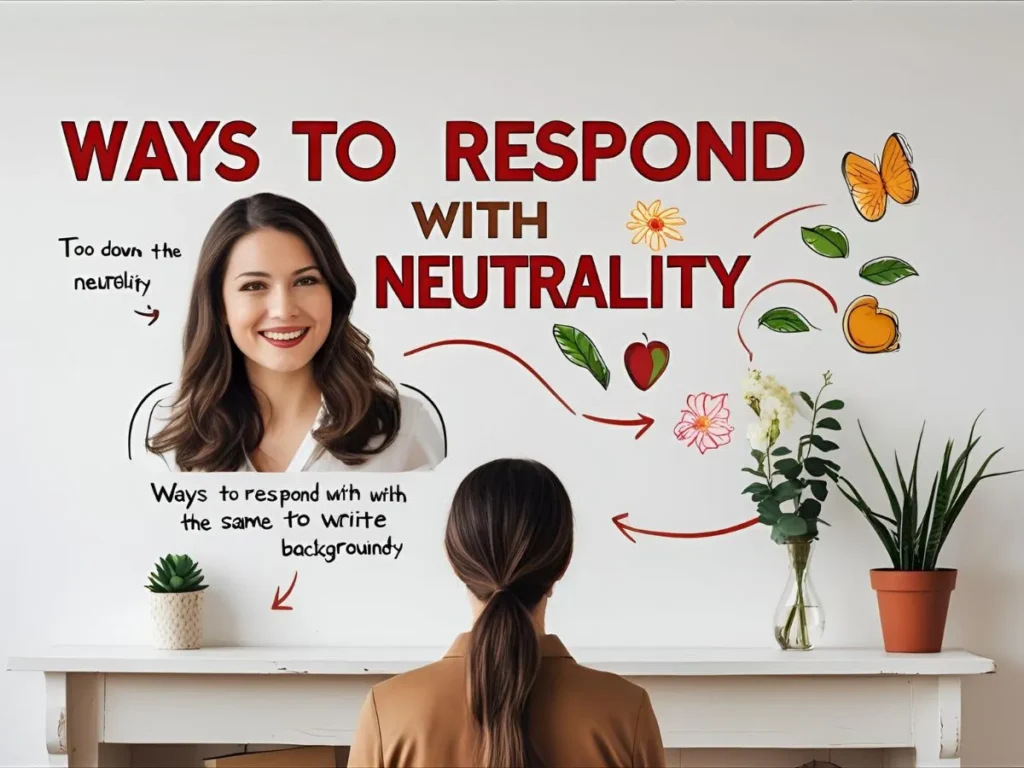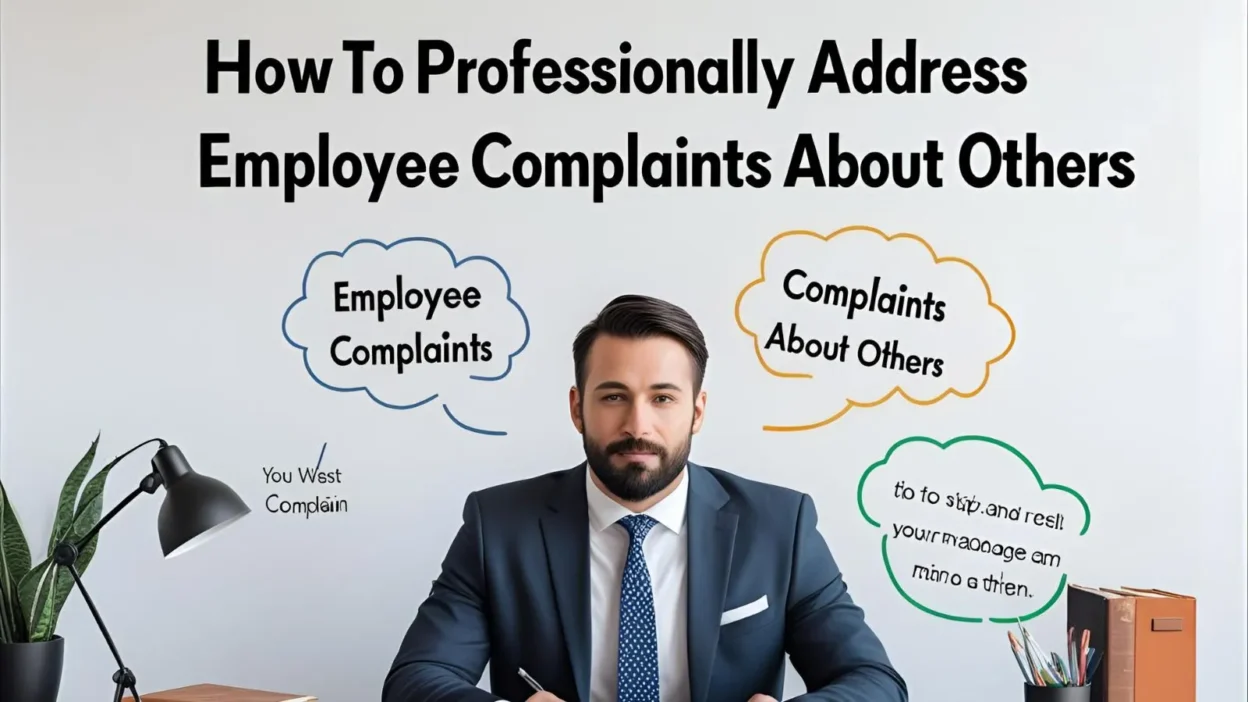Workplace complaints can feel tricky, but handling them with care keeps your team healthy and productive.
When one employee complains about another, it’s important to respond with balance, respect, and professionalism.
This article gives you practical responses that are simple, kind, and effective.
Let’s Dive In
Ways to Show You Are Listening
- Thank you for coming to me with this.
- I hear your concern and I want to understand it fully.
- I appreciate your honesty in sharing this.
- Let’s walk through what happened step by step.
- I’m here to listen, please continue.
- Your perspective matters and I want to hear it.
- Tell me more about how this affected you.
- I value your trust in raising this issue.
- I want to make sure I understand everything.
- I’m taking notes so I capture this correctly.
- Let’s slow down and go through this carefully.
- I’m glad you spoke up instead of keeping it inside.
- Your feelings are important and I want to recognize that.
- Can you give me an example to help me see it clearly?
- I will listen without judging you.
- This is a safe space for your concerns.
- You are not alone in this.
- Please take your time to explain.
- I want to understand both the facts and how you feel.
- Thanks for trusting me with this situation.
Ways to Respond With Neutrality

- I want to remain fair and balanced while hearing this.
- I will not take sides right now.
- Let’s focus on facts before we draw conclusions.
- It’s important that I hear from both people.
- I appreciate your perspective and will also seek the other side.
- I will handle this carefully without favoritism.
- I want to understand without rushing to judge.
- Both employees deserve to be heard fairly.
- I’m here to be neutral and fair to everyone.
- I’ll make sure we separate facts from emotions.
- I’ll check in with the other person before making any decisions.
- Let’s look at this issue, not the person.
- My role is to be balanced and supportive.
- I want to avoid assumptions and focus on evidence.
- This is about solving the problem, not picking sides.
- I’ll gather more information before responding further.
- Let’s explore options without blaming.
- I’ll keep an open mind as we move forward.
- I’ll focus on solutions, not personal conflicts.
- Both of you matter to this team equally.
Ways to Show Empathy
- That sounds like a tough situation.
- I can see why this upset you.
- I understand how this could be frustrating.
- It sounds like you’ve been carrying this for a while.
- That must have been stressful for you.
- I hear how important this is to you.
- I can tell this has affected your workday.
- It makes sense you would feel that way.
- I respect how you are handling this.
- I understand this is not easy to talk about.
- I see the impact this is having on you.
- I hear your frustration and I want to help.
- I can imagine how draining this has been.
- I respect your courage in bringing this forward.
- You are right to expect respect at work.
- That sounds like a difficult moment.
- I know this took effort to share with me.
- It’s clear this situation matters a lot to you.
- You deserve to feel safe and respected here.
- Your well-being is important and I take that seriously.
Ways to Gather More Details

- Can you walk me through the exact situation?
- What was said or done that upset you?
- How often has this happened?
- When did this last occur?
- Was anyone else present?
- Can you give me specific examples?
- How did you respond at the time?
- Has this behavior changed over time?
- Has this affected your work performance?
- How long has this been happening?
- Has anyone else mentioned similar issues?
- How did you feel in the moment?
- Can you describe the setting when this happened?
- What outcome are you hoping for?
- Have you spoken to the other person about it?
- Has this situation gotten worse or stayed the same?
- Were there witnesses I can also talk to?
- Can you explain what would improve the situation?
- How urgent does this feel to you?
- Is there anything you think I may have missed?
Ways to Offer Assurance
- I will take this concern seriously.
- You can count on me to follow up.
- I will keep this as confidential as possible.
- We will work toward a fair outcome.
- You don’t need to worry about being ignored.
- I’m committed to helping resolve this.
- You did the right thing by speaking up.
- This will not be brushed aside.
- I will treat this with care.
- You can expect me to act professionally.
- I want you to feel safe here.
- I’ll handle this in line with policy.
- You won’t face retaliation for raising this.
- I will stay in touch about next steps.
- I’ll move forward respectfully with both parties.
- You are not alone in this process.
- I’ll protect your dignity in how we handle this.
- I want to assure you this is being handled.
- I will follow our guidelines carefully.
- You can trust me to do this fairly.
Ways to Encourage Constructive Steps
- Let’s explore ways to improve the situation.
- How can we prevent this from happening again?
- Would you be open to a mediation?
- Let’s talk about solutions, not just the problem.
- What outcome would feel fair to you?
- Can we find common ground here?
- Let’s see what adjustments can be made.
- How can we make the work environment better for both of you?
- Would you be comfortable if I facilitate a conversation?
- Let’s set some positive next steps.
- Can we agree on what success would look like?
- What’s a small change that could help immediately?
- How can I support you going forward?
- Would coaching help in this situation?
- Let’s create an action plan together.
- What boundaries would help make this easier?
- Would you like regular check-ins?
- Let’s talk about what feels realistic.
- How can we make this a learning moment?
- Together, we can aim for improvement.
Ways to Maintain Professionalism
- I will handle this calmly and respectfully.
- Let’s keep this focused on work, not personal attacks.
- I want to uphold a professional tone in this process.
- We’ll keep this conversation respectful and constructive.
- I will document our discussion properly.
- Our policies will guide how I respond.
- I’ll ensure this stays professional, not emotional.
- I’ll communicate clearly and directly.
- I’ll treat both employees with equal respect.
- This will be handled with confidentiality.
- I’ll manage this with fairness in mind.
- We’ll keep the discussion free of blame.
- I’ll balance empathy with professionalism.
- Our workplace values will guide this.
- I’ll ensure no gossip spreads from this.
- We’ll keep this about solutions, not personal judgments.
- I’ll avoid favoritism in every step.
- Professional conduct is my top priority here.
- This will be handled with dignity for all.
- Our goal is a respectful resolution.
Ways to Follow Up After the Complaint
- Thank you again for raising this issue.
- I’ve spoken with the other employee as well.
- Here’s what steps I’ve taken so far.
- I will keep you updated on progress.
- We’ll schedule a follow-up meeting soon.
- Please let me know if things improve.
- I want to check in on how you’re feeling.
- Here’s what actions we agreed to.
- I’ll continue to monitor the situation.
- Let’s review how the changes are working.
- Please share any new concerns quickly.
- I’ll keep documenting developments.
- I’m here if you need to talk again.
- Let’s revisit this in two weeks.
- Your feedback on the progress is valuable.
- We’ll keep the lines of communication open.
- I’ll make sure no retaliation occurs.
- I’m committed to following this through.
- Thank you for your patience during this process.
- Let’s make sure this resolution lasts.
Conclusion
When an employee complains about another employee, the key is balance: listen with empathy, stay neutral, gather details, and work toward solutions. With the right approach, you can turn conflict into an opportunity for growth, respect, and stronger teamwork.




